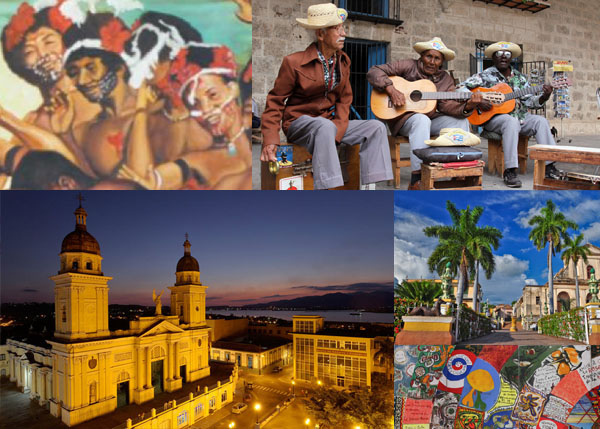12.14.4 Sergio Vitier García-Marruz

Sergio Vitier García-Marruz is a great composer and concert artist, as well as one of Cuba’s most important guitarists. He was born on January 18, 1948, in Havana. His parents, Cintio Vitier and Fina García-Marruz, are renowned poets and essayists.
He studied music at the Amadeo Roldán Conservatory (Rastro No. 1 and Espada, Centro Habana, Havana). He took guitar lessons with Elías Barreiro and completed them with Isaac Incola. He learned harmony and composition with Federico Smith and with José Ardévol and Leo Brouwer. At the Instituto Superior de Arte (ISA) (1110 Calle 120 between 9th and 13th, Cubanacán, Playa, Havana), he studied with José Loyola and Roberto Valera. He also studied orchestration, harmony, counterpoint, and composition at the same time.
He began his artistic career with Felipe Dulzaides’s Los Armónicos, from 1964 to 1966. Later he became a member of the Cuban Orchestra of Modern Music (1967-1969), and belonged to the ICAIC Sound Experimentation Group from its beginnings in 1969 until 1978.
In 1968, Sergio Vitier founded the group ORU, composed of Jesús Pérez, Merceditas Valdés, Guillermo Barreto, Orlando López (Cachaíto), Gema Corredera, Javier Zalva, Genaro García Caturla, among others. This group has brought together musicians from major Cuban musical traditions, conducting research into elements of African and Spanish folklore, which is combined with his own creative work and that of other contemporary composers.
Among his songs we can mention: Love and Sacrifice; Effect; Angels; Untimely; The Singing Goblin; I Spoke to My Loneliness; Children II; Lie; Pedrosa; For the Sun and Thirst; and I Can Lay Down to Die.
One of the strongest trends in his work as a composer has been the creation of music for film. His film works include: Notes for the History of the Workers’ Movement (Documentary); Capablanca; Fifty-Five Brothers; Che; In a Certain Way; Sportingly; Right of Asylum; The Brigade Member; The Specter of War; Everyone’s October; The Moncada Program; Girón; Border Guard; Men of the Ring (Documentary); Tribute to Benny Moré; Chief of Column 4; The Earth and the Sky; Maluala; Opening; Plácido; Love Me and You Will See; Scented Oak; Tatu: Che in the Congo; A Happy Summer; and A Woman, a Man.
In its various instrumental combinations are: About a Yoruba Theme, for flute, oboe and guitar; Danzarias, for chamber group, Cuban percussion and two voices; Detachments, for symphony orchestra and Cuban percussion; Utopia, Lyrics, Rhythmic and Final, for wind quintet; Small Rhythm Session, for Cuban percussion; Requiem for Ernesto Guevara (in collaboration with Rogelio Martínez Furé), text: Tomás González, for prepared piano, guitar, flugelhorn, bongo, male voice and batá drums; Roots, for prepared piano, electric guitar, xylophone, tape recorder and two solo male voices and Three Trenes, for flute, prepared piano, guitar and tape recorder.
Sergio Vitier’s compositions for dance include: Ad Limitum; Amanda; Song to Kill the Snake; From the Barracks to the Trench; Duet of Always; Faust; Flora; Freíd; The Hunt; Mariana; Michelangelo; Palenque; Dance Rite; and Yerma. His music for theatre includes: The Kremlin Chime; Divine Words; Epur Si Movimento; Love Duet; Rock with Batá; The Standard Bearer; The Ridiculous and Tragic Ascension of Rubén Zaldívar; Manteca; Mariana Pineda; Overture and Finale; Son de las Locas; and Theme in D. Finally, his works for television series include: The Echo of the Stones; The Man Who Had to Be Killed; It Had to Be in Silence (in collaboration with José María Vitier); Frente Sur; Julián Guerrero; Julito the Fisherman (in collaboration with José María Vitier); Luis and John in Morazán; Heading for Sunrise and Transparencies.
His discography includes works such as: Cuban Strings (album marking the 20th anniversary of his stage debut); Homenajes (EGREM Award, 1997); Visiones, ICAIC Sound Experimentation Group (five volumes); CD Pictures: 350 Postcards from Cuba; Journey (CUBADISCO Award, 2000); Sergio Vitier/Martha Valdés: Our Song; Sergio Vitier: Havana Concert (symphonic music).
Sergio Vitier has received the Cubadisco Award on several occasions: Travesía (2000), in the Instrumental Music Category; Grand Prize for Songwriting (2001); Roble de olor (2004), in the Soundtrack Category; and Oru, ritual and fiesta a lo cubano (2008), in Folk Music.
As a soloist and with his group, he has performed on international stages: Canada, Czechoslovakia, Bulgaria, Poland, Italy, Russia, Colombia, Venezuela, Brazil, Spain, France, and the United States. He has given lectures and master classes at universities, research centers, and other cultural institutions in several countries.
As stated in his official resume, Vitier “is a great researcher of the roots and traditions of the formants of Cuban culture. In his music, the presence of cells of Yoruba and Congo-Bantu origin can be appreciated, in an organic fusion with basic elements of Hispanic sound, especially in relation to the guitar. To this must be added his profound knowledge of the island’s popular traditions, as well as his great command of contemporary composition and orchestration techniques. All these factors interrelate and merge in his work, making it one of the most original, prolific, and innovative in the world of Cuban music in the last thirty years.”
Sergio Vitier’s guitar playing talents are undoubtedly vast: a formidable left hand, a well-rounded approach to performance, and a powerful sound make this composer one of Cuba’s greatest guitarists.








